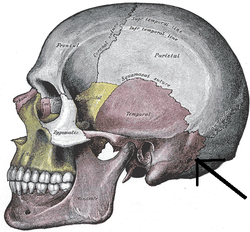Mastoid process of the temporal bone
| Mastoid part of the temporal bone | |
|---|---|

Side view of head, showing surface relations of bones.
|
|

Occipitomastoid suture. (Temporal bone is in purple, and mastoid portion is immediately to the left of the tip of the arrow.)
|
|
| Details | |
| Latin | pars mastoidea ossis temporalis |
|
Anatomical terms of bone
[]
|
|
The mastoid part of the temporal bone is the back part of the temporal bone. Its rough surface gives attachment to various muscles and it has openings for the transmission of blood vessels. From its borders the mastoid part articulates with two other bones.
Its outer surface is rough, and gives attachment to the occipitalis and posterior auricular muscles. It is perforated by numerous foramina (holes); one of these, of large size, situated near the posterior border, is termed the mastoid foramen; it transmits a vein to the transverse sinus and a small branch of the occipital artery to the dura mater.
The position and size of this foramen are very variable; it is not always present; sometimes it is situated in the occipital bone, or in the suture between the temporal and the occipital.
The mastoid portion is continued below into a conical or pyramidal projection, the mastoid process, the size and form of which vary somewhat; it is larger in the male than in the female. It is also filled with sinuses, or mastoid cells. The mastoid process is located just behind the ear canal, and lateral to the styloid process.
The mastoid process serves for the attachment of the sternocleidomastoid, splenius capitis (the posterior belly of the digastric muscle), and longissimus capitis.
...
Wikipedia
